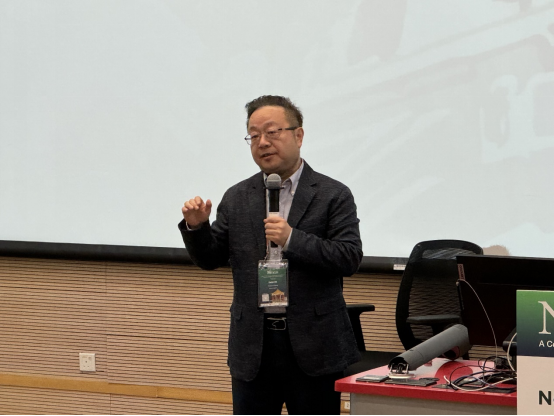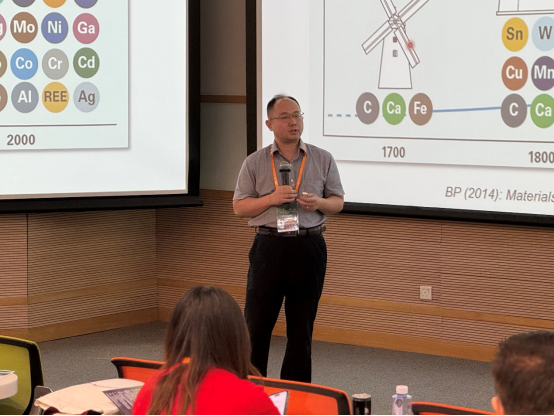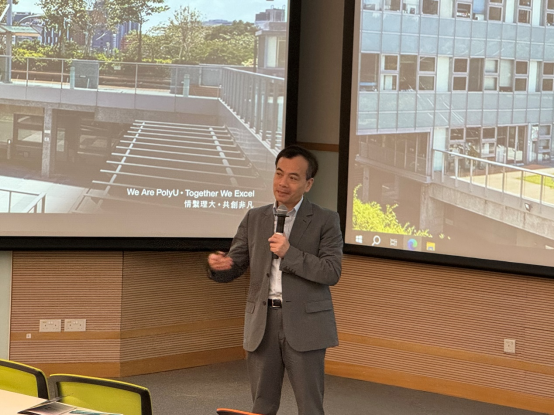On May 10, 2024, the Carbon Neutrality and Energy System Transformation (CNEST) Forum was successfully held at the Hong Kong Polytechnic University during Nexus Forum 2024. The CNEST forum was jointly organized by the Institute for Carbon Neutrality of Tsinghua University (ICON, Tsinghua) and the International Urban Energy Research Center of the Hong Kong Polytechnic University, and invited seven experts from home and abroad to give wonderful keynote speeches.

Professor He Kebin, academician of the Chinese Academy of Engineering and dean of the ICON, delivered a keynote speech “Transformation for a Carbon-Neutral Future” at the meeting. He introduced the background trends of global climate change and carbon neutrality, and systematically expounded the comprehensive solutions and challenges of energy flow, material flow, carbon flow, and information flow required for carbon neutrality and energy system transformation. He also introduced the importance and existing resources of innovation, interdisciplinary, and international cooperation, including the “Carbon Neutrality and Energy System Transformation” (CNEST) program initiated by Tsinghua University.

Professor Michael Obersteiner, director of the Institute for Environmental Change at the University of Oxford, UK, delivered a keynote speech “The Intersection Negotiations: Insights for a Serious Sustainability ‘Game’”. He presented Scenathon model for international implementation process optimization, which attempts to incorporate factors such as foreign trade and policy coordination between countries to promote the mutual coordination and common realization of national sustainable development goals and action paths. This model has become an important part of the research methodology of International Food, Agriculture, Biodiversity, Land Use and Energy Research Consortium (FABLE).

Professor Nan Zhou, chief scientist at Lawrence Berkeley National Laboratory in the United States, delivered a keynote speech “A National Development Path for Grid-Interactive Energy-Saving Buildings”. She presented the results of scenario analysis of carbon dioxide emissions reduction, energy consumption, and electricity consumption of American buildings in 2020-2050, and pointed out that the total benefits of energy saving and emission reduction in buildings by 2050 can offset about one-third of the carbon reduction cost of the power system.

Professor Chen Weiqiang, a researcher at the Institute of Urban Environment, Chinese Academy of Sciences, gave a keynote speech “Coupling and Sustainability of Metals and Energy”. He pointed out that new energy technologies such as electric vehicles, wind power, and photovoltaic are material-intensive technologies, and energy transformation relies on the support of various metals and minerals. These materials have decentralized and complex global supply chains, and it is necessary to strengthen international cooperation to promote the security of the supply chain, and timely deploy efficient recycling and green recycling technologies for new energy waste.

Mr. Paul Tomlinson, COO of China Light & Power Co., Ltd. in Hong Kong, presented a keynote speech “Harnessing Innovation to Drive the Sustainability of Hong Kong’s Largest Internet of Things: CLP’s Advanced Metering Infrastructure”, introducing the company’s development of a smart meter Internet of Things network.

Professor Li Xianguo, academician of the Canadian Academy of Engineering and professor of Mechanical Engineering at the University of Waterloo, Canada, gave a keynote speech “Energy and Water Sustainability: the feasibility of electrolysis technology”. He traced the evolution history of the energy system and the future development trend of hydrogen energy, proposed that energy can be divided into static energy that is easy to store and transport and dynamic energy that is difficult to store and transport, and pointed out that there is a risk of water shortage in the future.

Dr. Shi Han, researcher at the Center for Modern China and the World at the University of Hong Kong, gave a keynote speech “Business Model Innovation for Promoting Sustainable Development”. He described the types of innovative business models and the sources of various business drivers that support sustainable development, and introduced the six-capital assessment model for the implementation of corporate sustainable development goals.

The first half of the forum was hosted by Professor Li Yongdan from the School of Chemical Technology at Aalto University in Finland, and the second half was jointly hosted by Professor Lu Xi from the ICON, and Professor Feng Wei from the Shenzhen Institute of Technology of the Chinese Academy of Sciences.
Nexus Forum 2024 focused on the theme of “Sustainable Exploration of Interdisciplinary Research and Innovation”, was organized by Nexus and jointly organized by the Hong Kong Polytechnic University and Cell Press, and concluded successfully on the campus of the Hong Kong Polytechnic University on May 10, 2024. The two-day forum attracted more than 150 keynote speakers, authors, workshop speakers, faculty, and students from Canada, the UK, the US, Germany, Japan, and the Chinese mainland.

 Latest recommendations
Latest recommendations


